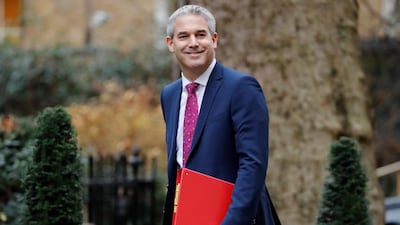The British government met on Tuesday to discuss allocating more funds to no-deal Brexit preparations as division over Theresa May’s Brexit withdrawal agreement continues.
Ministers were expected to decide how an extra £2 billion (Dh9.6 billion) in government funding will be divided between departments in the event that Britain crashes out of the EU on March 29, 2019 without a divorce deal, according to British media reports. The figure more than doubles the £1.5 billion allotted for contingency planning for disruption as trade and travel barriers go up.
Mrs May postponed a parliamentary vote on her Brexit deal until the week of January 14 when it became clear it would fail to win a majority.
On Monday, Mrs May acknowledged the threat of leaving the EU without a deal and said cabinet would be meeting to ensure “we are ready for that scenario".
“Disruption will take place in no-deal in the short term,” she said. “We want to take every step we can to mitigate that.”
Speaking on Tuesday, Communities minister James Brokenshire said the government did not want to see a no-deal Brexit but it was “right and proper” to prepare for such an eventuality.
While the health minister Matthew Hancock said his department was preparing to store six weeks’ worth of stockpiled medicines for the country’s National Health Service if no-deal became a reality.
Mr Hancock told the BBC that he had become “the largest buyer of fridges in the world”
Meanwhile opposition party Labour tabled a vote of no confidence in the prime minister, arguing she was deliberately wasting time by putting off the vote.
The move led by Labour leader Jeremy Corbyn is largely symbolic and the motion will not be granted a parliamentary debate this year, Downing Street sources said.
The Pro-Brexit wing of Mrs May’s party, who last week triggered a vote of no confidence in her leadership, said they would stand by the prime minister should Mr Corbyn push for a vote of no confidence in the government. Such a motion would have to be debated and voted on in parliament.
______________
Read more:
British opposition Labour party tables motion of no-confidence in Theresa May
Tony Blair makes fresh pitch for second Brexit referendum
Opinion: Europe will also suffer from a no-deal Brexit
______________
Jacob Rees-Mogg, leader of the European Reform Group and one of the 117 Conservative MPs to vote against the prime minister last week, said he would support Mrs May.
He told Sky News: "I lost the vote last week - and if you lose, that is ultimately conclusive."
Mr Rees-Mogg and other Brexiteers believe a so-called “managed no-deal” would be preferential to the agreement Mrs May has made with Brussels.
Senior ministers including foreign secretary Jeremy Hunt are warming to the idea of a no-deal exit if the deal with Brussels is rejected.
According to the Telegraph, they believe they can secure a two-year transition period before exiting without an agreement.
But Brussels has ruled out making mini deals with Britain to avoid the economic chaos of a hard Brexit.
Senior EU official Guy Verhofstadt warned British ministers on Tuesday that there was “no such thing” as a managed no deal.
Work and pensions minister Amber Rudd, a Remain voter, is also said to be against a managed no deal, reportedly telling the cabinet meeting: “Just because you’ve put a seatbelt on, it doesn’t mean you should crash the car.”

